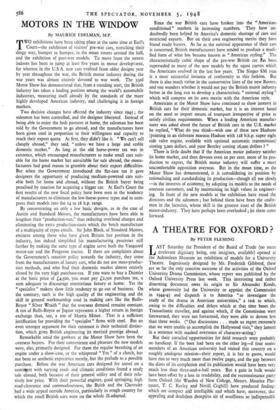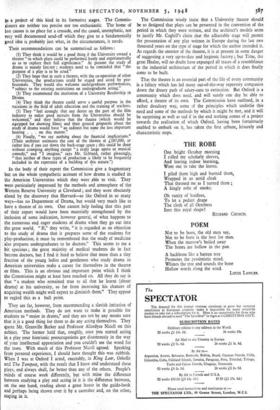A THEATRE FOR OXFORD ?
By PETER FLEMING But their curtailed =opportunities for field research were probably no handicap. If the boot had been on the other leg—if four senior members of an American university had visited this country on a roughly analogous mission—their report, it is fair to guess, would have run to very much more than twelve pages, and the gap between the dates of its completion and its publication would have been very much less, than three-and-a-half years. 'But a gain in bulk would have been offset by a loss in readability, and the reconnaissance party from Oxford (the Warden of New College, Messrs. Maurice Plat- nauer, T. C. Keeley and Nevin. Coghill) have produced findings which are compact ate intelligible and which have, moreover, that appealing and doubtless deceptive air of woolliness so indispensable
to a project of this kind in its formative stages. The Commis- sioners are neither too precise nor too enthusiastic. The home of lost causes is no place for a crusade,sand the casual, unemphatic, not very well documented send-off which they give to a fundamentally good idea is probably just what, in the circumstances, it needs.
Their recommendations can be summarised as follows:
(I) They think it would be a good thing if the University owned a theatre "in which plays could be performed freely and experimentally so as to explore their full significance." At present the study of drama is mainly literary • students need to be reminded that the purpose of a play is to be acted."
(2) They hope that in such a theatre, with the co-operation of other Universities, the productions could be staged and acted by pro- fessionals. They would also welcome undergraduate performances, " subject to the existing restrictions on undergraduate acting."
(3) They recommend the institution of a University Readership in Drama.
(4)• They think the theatre could serve a useful purpose in the vacations in the field of adult education and the training of teachers.
(5) They "feel strongly that any desire on the part of the film industry to enlist good recruits from the Universities should be welcomed," and they believe that the theatre (which would be equipped for showing films) and their general proposals about the study of drama would have an indirect but none the less important bearing . . . on this matter?'
(6) Finally, " we say nothing about the financial implications." (Their architect estimates the cost of the theatre at £187,000, or rather less if you cut down the back-stage space ; this could be done without cramping anything except " a really large opera or musical comedy'," - and " I imagine," says Mr. Gibberd, rather pleasingly, " that neither of these types of production is likely to be frequently included in the repertoire of a building of this nature.") In the body of their report the Commission give a fragmentary but on the whole sympathetic account of how drama is studied in the American Universities which they were Able to visit. They
were-particularly impressed by the methods and atmosphere of the Western Reserve University at Cleveland ; and they were obscurely elated by the discovery that Harvard—so like Oxford in so many ways—has no Department of Drama, but would very much like to have a theatre of its own. One cannot help feeling that this part of their report would have been materially strengthened by the inclusion of some indication, however general, of what happens to the numerous and eager students of drama when they go out into the great world. " If," they write, " it is regarded as an objection to the study of drama that it prepares some of the students for play-production, it must be remembered that the study of medicine also prepares undergraduates to be doctors." This seems to me a bit specious ; the great majority of medical 'students do in fact become doctors, but I find it hard to believe that more than a tiny fraction of the young ladies and gentlemen who study drama in American universities make a career for themselves in the theatre or films. This is an obvious and important point which I think the Commission might at least have touched on. All they do say is that " a student who remained true to all that he learnt (about drama) at his university, so far from increasing his chances of acquiring wealth might well expect to diminish them." They appear to regard this as a bull point.
They are far, however, from recommending a slavish imitation of American methods. They do not want to make it possible for students to " major in drama," and they are not by any means sure that it is a good thing for them to do any acting themselves. They
quote Mr. Granville Barker and -Professor Allardyce Nicoll on this
subject. The former held that, roughly, once you started acting in a play your histrionic preoccupations got disastrously in the way of your intellectual appreciation and you couldn't see the wood for the trees. With much of this Professor Nicoll agreed. Speaking
from personal experience, I should have thought this was rubbish. When I was at Oxford I acted, execrably, in King Lear, Othello and The Tempest, with the result that I know and understand these plays, and always shall, far better than any of the others. People's
minds of course work differently, but with mine the difference between studying a play and acting in it is the difference between,
on the one hand, reading about a great house in the guide-hook and perhaps being shown over- it by a caretaker and, on the other, staying in in
The Commission wisely insist that a University theatre should be so designed that plays can be presented in the convention of the period in which they were written, and the architect's models seem to justify Mr. Coghill's claim that the adjustable stage will permit the presentation of any play written in Europe during the last two thousand years on the type of stage for which the author intended it. As regards the exterior of the theatre, it is at present in some danger of suggesting a very up-to-date and hygienic factory ; but Time, the great Healer, will no doubt have expunged all traces of a resemblance to the industrial architecture of the period in which it does finally come to be built.
That the theatre is an essential part of the life of every community is a fallacy which has led many out-of-the-way repertory companies down the dreary path of salary-cuts to extinction. But Oxford is a community which does need, and will surely one day be able to afford, a theatre of its own. The Commission have outlined, in a rather desultory way, some of the principles which underlie this need and some of the methods by which it might be met, and it will be surprising as well as sad if in the end nothing comes of a project towards the realisation of which Oxford, having been fortuitously enabled to embark on it, has taken the first urbane, leisurely and characteristic steps.











































 Previous page
Previous page